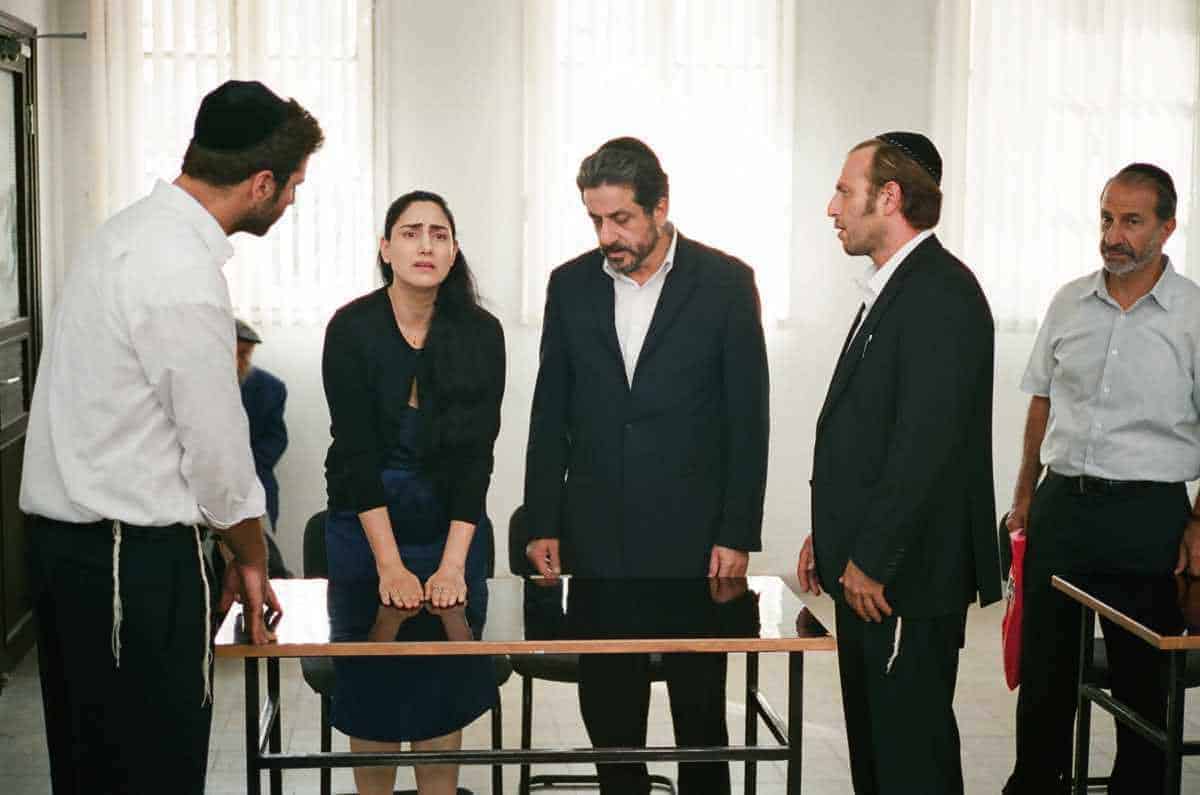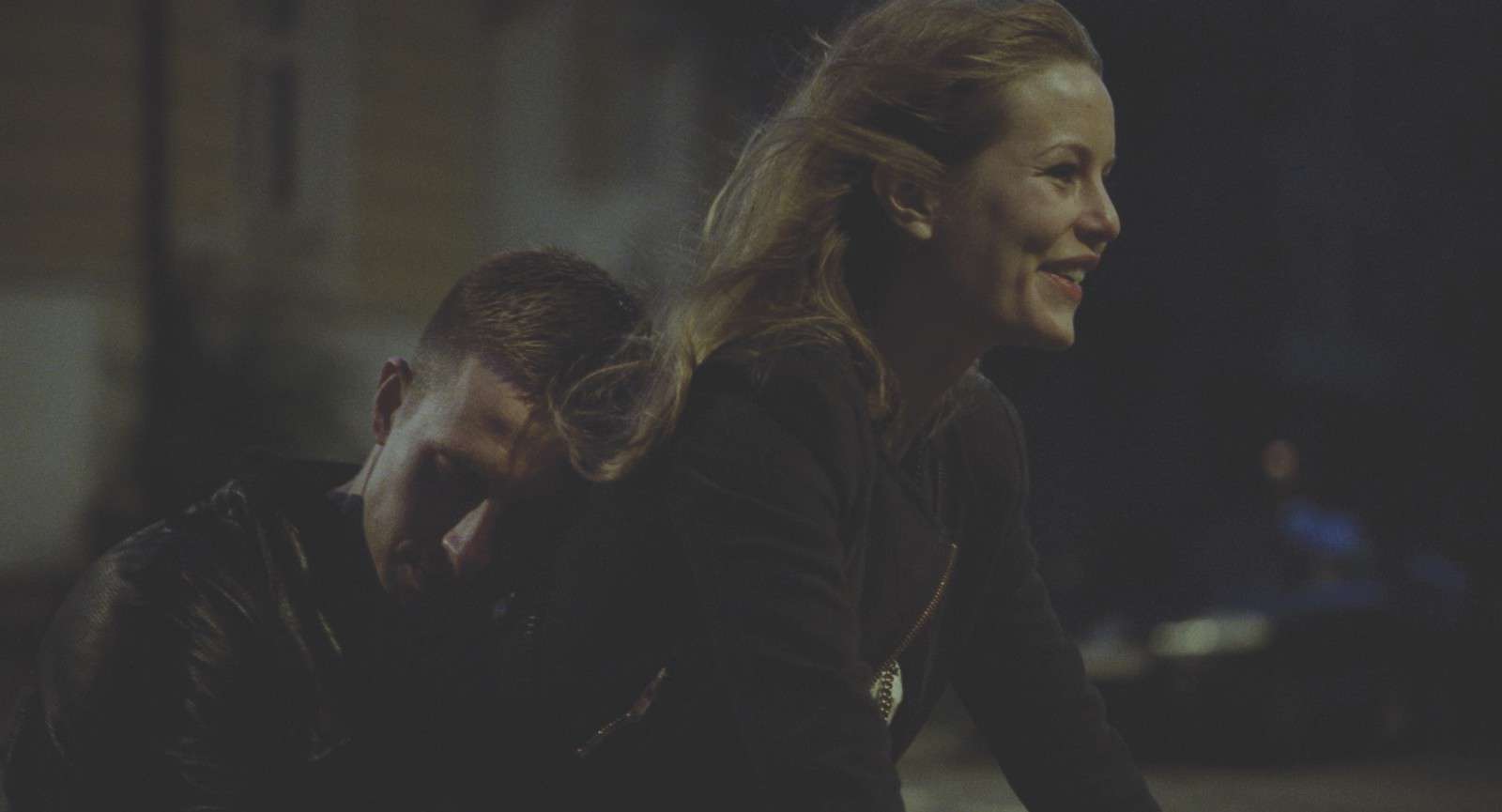Ronit and Shlomi Elkmbetz direct this grueling, heartbreaking courtroom drama. Gets: The Trial of Viviane Amsalem, which follows a divorce case over five years, all from within the courtroom itself.

Gett: The Trial of Viviane Amsalem opens in a courtroom; we mostly won’t leave it for the next two hours, which span five years. Only subtle changes in costumes and demeanor give us a window into what has happened in the world outside. This courtroom is some kind of cruel purgatory.
At the front of the room are three rabbinical judges, old bearded men, who peer down at us with unequivocal power from their elevated bench. To the left is the middle-aged Rabbi Shimon in a kipa (Sasson Gabai), acting as advocate for Elisha Amsalem (Simon Abkarian, “Yes”) who has chosen not to come to court when beckoned: we see Shimon from the side, and from afar. And finally, there’s Carmel (Menashe Noy), whom we gaze up at from below at his side, with affection and admiration, as he stands and talks, as if we’re sitting right next to him.
The matter under discussion is the “Gett” —the Jewish term for a divorce — that Viviane Amsalem has requested from her not present husband, only we haven’t seen or heard from Viviane. It slowly dawns on us that it’s because we’ve been watching the events unfold from her perspective: the camera is her eye. She’s not onscreen — not visible, not heard — because in the patriarchal, rabbinical court, she might as well be invisible, because that’s how she’s treated. Within the film’s first five minutes, we feel as enraged, outraged, and powerless as Viviane does. But she is not invisible to us, because we’re completely in her shoes.
In Israel, marriage and divorce are the few things still left entirely to Orthodox — old-fashioned — Jewish law, to be presided over by Rabbis rather than the civil courts. Justice is not the priority. A recognized divorce is crucial, especially for a woman with children, or else her children will automatically be seen as bastards, social outcasts and unable to marry — yes, this is present day we’re talking about. To get a divorce, the husband must consent, and nobody can force him to consent. The best a woman can hope for is for the Rabbinical court to recommend an enforced Gett, but even that is a difficult thing to achieve. There is, however, a hell-of-a-lot that the courts and the husband can force the wife to do in a bid for her freedom from her marriage.
When the proceedings for Viviane’s Gett begin, she has been living separately from her husband for two years, but still funneling money into their joint bank account to pay off their mortgage, while supporting herself entirely, and cooking every meal for her children remotely; the children still live with their father. Rather than listen to what Viviane and her advocate are plainly saying — that living with her husband has become intolerable, that they’re a poor match — the court is set on their reunion. The rabbis refuse to even hear arguments until Viviane returns home to her husband for six months to try to make it work. Begrudgingly, she complies, but we only see her six months later, back in the same court room, crestfallen.
It’s over a year before her husband even deigns to show up in court. The rabbis have the power to threaten him with jail time, but bide their time before even threatening to take away his driver’s license — a suggestion that just makes Viviane laugh at the absurdity, because her husband doesn’t even have one. They aren’t serious about giving Viviane agency. Viviane notes that in America, if a husband fails to answer summons twice, the divorce is automatic. Not so in Israel: everything is designed to work in his favour, for him to exercise control, even if that means torturing his wife out of malice, just because he can.
Once the trial itself gets underway — more than a year in — it’s an investigation of whether or not Elisha is a model — or perhaps more accurately, tolerable — husband, and whether or not Viviane’s request is driven by wanton desire. Friends and family members are brought forth as character witnesses, none wishing to publicly shame Elisha, nor to suggest that anything but reconciliation is the answer.
But Carmel is smart, and when pressed, when pushed, the truth about Elisha’s character starts to come out: he’s pedantic, stubborn, childish, insufferable, and he makes Viviane miserable. Even still, the proceedings continue, year after year. All the while, we watch Viviane suffer in silence in court, as each word spoken brings her further from the Gett she doesn’t just want but, more and more, needs.
There are two rare moments of reprieve outside of the courtroom, in the waiting room, each small but revealing. The first is between Viviane and Carmel, where she helps him fix his tie so calmly and familiarly that we wonder if there’s some additional shared intimacy not on display in court. He clearly admires her and perhaps even loves her: the passion with which he fights for her cause is strong, but then again, watching a woman you barely know suffer for years could do that to any compassionate man. The second is between Viviane and Elisha, when they exchange small talk about their son’s new job, just as it seems as if he’s agreed to the Gett. It’s courteous and cordial and mature, but in context, it’s not a two-way street: when she moved back in with him, he didn’t speak to her, and he’s the one who has been blocking her freedom. If there’s anyone turning the other cheek, it’s her.
Although she rarely speaks, Ronit Elkmbetz gives an impressive and heartbreaking performance as Viviane, a strong woman who has no rights but who refuses to take it lying down. Even when she can’t speak, she’s fighting the fight: the rebuke in her eyes for an injustice being said, the compassion for a witness who is speaking a hard truth, and the will to keep fighting this impossible fight. Simon Abkarian, who was fabulous in Sally Potter’s brilliant film “Yes,” is also a wonderful, quiet force: he rarely speaks, but you can see the hateful power in his eyes, and the ease with which he convinces himself and others of his god-given right to wield it. By prioritizing Viviane’s point of view, showing us her reactions, and making her feelings and will always visible to the audience, co-directors Ronit Elkmbetz and Shlomi Elkmbetz give Viviane the voice and agency that the courts refuse her.

